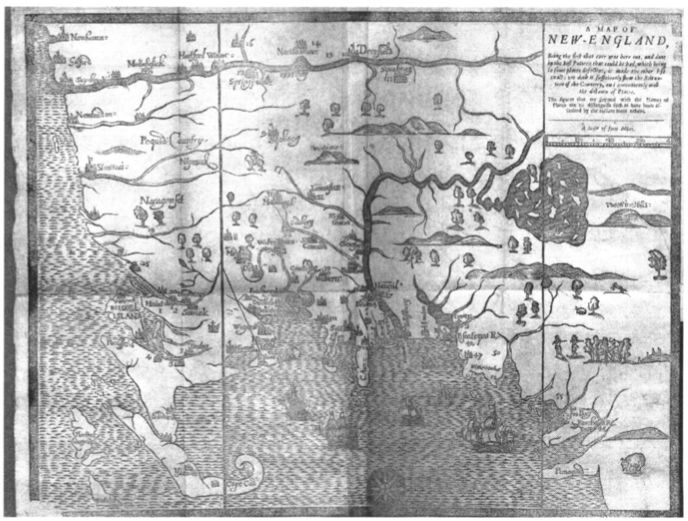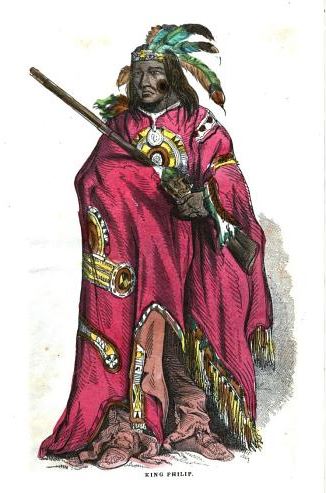Edited by Sofia Morano
The morning being come, they prepared to go on their way. One of the Indians got up upon a horse, and they set me up behind him, with my poor sick babe in my lap. A very wearisome and tedious day I had of it; what with my own wound, and my child’s being so exceeding1 sick, and in a lamentable condition with her wound. It may be easily judged what a poor feeble condition we were in, there being not the least crumb of refreshing2 that came within either of our mouths from Wednesday night to Saturday night, except only a little cold water.

When we were come, Oh the number of pagans (now merciless enemies) that there came about me, that I may say as David, “I had fainted, unless I had believed, etc.” (Psalm 27.13). The next day was the Sabbath3. I then remembered how careless I had been of God’s holy time; how many Sabbaths I had lost and misspent, and how evilly I had walked in God’s sight; which lay so close unto my spirit, that it was easy for me to see how righteous it was with God to cut off the thread of my life4and cast me out of His presence forever. Yet the Lord still showed mercy to me, and upheld me; and as He wounded me with one hand, so he healed me with the other. This day there came to me one Robert Pepper5 (a man belonging to Roxbury) who was taken in Captain Beers’s fight, and had been now a considerable time with the Indians; and up with them almost as far as Albany, to see King Philip, as he told me, and was now very lately come into these parts.
Hearing, I say, that I was in this Indian town, he obtained leave to come and see me. He told me he himself was wounded in the leg at Captain Beer’s fight; and was not able some time to go, but as they carried him, and as he took oaken leaves and laid to his wound, and through the blessing of God he was able to travel again. Then I took oaken leaves and laid to my side, and with the blessing of God it cured me also; yet before the cure was wrought, I may say, as it is in Psalm 38.5-6 “My wounds stink and are corrupt, I am troubled, I am bowed down greatly, I go mourning all the day long.” I sat much alone with a poor wounded child in my lap, which moaned night and day, having nothing to revive the body, or cheer the spirits of her, but instead of that, sometimes one Indian would come and tell me one hour that “your master will knock your child in the head,6 and then a second, and then a third, “your master will quickly knock your child in the head.”
This was the comfort I had from them, miserable comforters are ye all, as he said7. Thus nine days I sat upon my knees, with my babe in my lap, till my flesh was raw again; my child being even ready to depart this sorrowful world, they bade me carry it out to another wigwam (I suppose because they would not be troubled with such spectacles) whither I went with a very heavy heart, and down I sat with the picture of death in my lap. About two hours in the night, my sweet babe like a lamb8 departed this life on Feb. 18, 1675. It being about six years, and five months old.
It was nine days from the first wounding, in this miserable condition, without any refreshing of one nature or other, except a little cold water.
I cannot but take notice how at another time I could not bear to be in the room where any dead person was, but now the case is changed; I must and could lie down by my dead babe, side by side all the night after. I have thought since of the wonderful goodness of God to me in preserving me in the use of my reason and senses in that distressed time, that I did not use wicked and violent means to end my own miserable life.
Thanks to Project Gutenberg for providing the digitized version of this text free of charge.
Without their generosity, this project would not be possible.
Works Cited
Bible Gateway, 1599 Geneva Bible GNV. www.biblegateway.com/passage/?search=Exodus+16.
Brooks, L. “Turning the Looking Glass on King Philip’s War: Locating American Literature in Native Space.” American Literary History, vol. 25, no. 4, 2013, pp. 718-750.
Ellis, George; John Morris. King Philip’s War. Ch. 7. 2009. penelope.uchicago.edu/Thayer/E/Gazetteer/Places/America/United_States/_Topics/history/_Texts/EAMKPW/7*.html.
Merriam-Webster, Merriam-Webster, www.merriam-webster.com/dictionary/thread of life.
OED Online, Oxford Univerity Press, September 2020. Accessed October 29 2020.
Footnotes
exceedingly ↩
Food that would replenish their energy. OED Online ↩
The Sabbath is a day during the week set aside specifically for rest and worship. BibleGateway ↩
“The course of individual existence especially as fabled in ancient times to be spun and cut by the Fates”. Merriam Webster. ↩
“Several of Beers’ men were captured, one of whom, Robert Pepper of Roxbury, was succored by Sagamore Sam and accompanied him on a visit to Philip near Albany in the winter. He fell in with Mrs. Rowlandson during her captivity and finally made his way home having been not unkindly treated.” Ellis, para. 10. ↩
“To stun or kill by a blow on the head; often loosely, to kill in any summary way, dispatch, put to death”. OED Online. ↩
Lambs are a recurring and symbolic animal in the bible, often referencing Jesus. BibleGateway ↩

